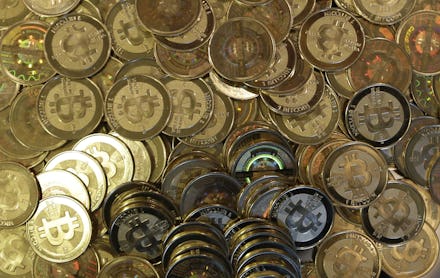How Bitcoin Works, in 5 Easy Steps

By now, you have most likely heard of Bitcoin, the "first decentralized digital currency," in the world. Created in 2009, the peer-to-peer currency used for instant electron payment. It is ideal for conducting international transactions because it is not subject to exchange rates or transactions fees, as it can be bought and sold on an exchange in return for the local currency. Though not the only crypto-currency, it certainly is the one that has drawn the most attention, and for good reason. In February 2013, one bitcoin would have cost you $20, as of this writing one bitcoin goes for about $900. Talk about a pretty good return on investment. So how does it work?
1. Who issues bitcoins?
Bitcoin has no central monetary authority. The creators have fixed the supply of bitcoins to around 21 million, and no new bitcoins can be added into the supply. Therefore, theoretically, a bitcoin can't be devalued. The system is based on a deflationary economic model. As time progresses, the available supply of bitcoins will decrease, eventually reaching its limit near 2140. As a result, the value of each bitcoin will rise in the long run, or so the argument goes.
2. How are they distributed?
Computers operating within a peer-to-peer computer network mathematically generate the currency. Known as Bitcoin "mining," the network approves a user's updates around every 10 minutes, and a fixed number of bitcoins is provided to the user. The system was developed so that as time progresses, it becomes more challenging to mine the bitcoins. As a result, people must continue to build powerful and massive computers to aquire the currency.
3. Who buys bitcoins and how can they be purchased or sold?
Bitcoins can be purchased (and sold) by anyone who holds traditional currency. Remember, Bitcoin is a digital currency. Though some physical bitcoins exist, each is linked with a distinct identification tag backed by real digital bitcoins embedded inside. In order for the owner to access the funds, the coin's hologram must be stripped away to reveal a redeemable "private key."
The owners of the physical coins and those online can conduct transactions at several worldwide exchanges, or directly between peers through software. Since Bitcoin can be bought and sold directly through the exchanges in return for a country's local currency, it is ideal for conducting international transactions without having to use exchange rates or pay bank fees.
While it reduces costs, the ease of the transactions, combined with the complexity of the Bitcoin system, has made Bitcoin attractive to individuals conducting illicit activities. Last month, a PolicyMic article detailed the prevalence of Bitcoin transactions on the (now closed) Silk Road market place.
4. Who accepts bitcoins as a means of exchange?
Over the past year, there has been a substantial increase in the number of merchants accepting Bitcoin as a valid method of payment. In fact, you can even buy a trip to space with Bitcoin. Around the U.S. many small and local businesses are beginning to accept the currency. Additionally, companies such as BitPay enable businesses to accept bitcoins as payment and then receive final payments in local currency. The service acts an intermediary, confirming the Bitcoin payment and paying the merchant in the local currency.
A similar service, Coinbase, just raised $25 million in a Series B round led by the venture capital firm of Marc Andreeseen, the co-founder of Netscape. The company provides services not only for merchants, but also for consumers. It has digital wallets, allowing users to purchase and sell bitcoins in addition to spending them. The company has over 600,000 users and has signed up over 16,000 merchants who will accept bitcoins through Coinbase. Yet small businesses aren't the only ones who accept the currency as payment.
On Nov. 21, the largest private university in Cyprus, the University of Nicosia, announced that it would start to accept Bitcoin as an alternative method of payment for tuition. The next day, Virgin Galactic announced that individuals will be able to purchase space flights with Bitcoin. Just this week, a man purchased a Tesla S, a car valued at costing approximately $103,000, with 91.3 bitcoins.
5. What does the market look like for investing in bitcoins?
The Bitcoin market is competitive and growing, but also risky. Investors and governments are beginning to take Bitcoin seriously. According to Bank of America Merrill Lynch, the market cap for Bitcoin is around $15 billion. Last week, China banned commercial banks from handling transactions with bitcoins, forcing companies such as Baiu, China's top search engine, to stop accepting it as a form of payment. The announcement caused the price of a bitcoin to fall by nearly 20%. But the prices have bounced back relatively quickly, and as of Dec. 13, bitcoins were priced at $919 on the Mt. Gox exchange. As discussed above, individuals are not only investing in the currency, but the services associated with it. When more companies begin to accept Bitcoin as payment, the demand for the currency is expected to increase.
Though investors seem increasingly interested in the currency, concerns about Bitcoin still remain, specifically, the apparent "bubble like" nature of the market. Former Chairman of the U.S. Federal Reserve Alan Greenspan referred to Bitcoin as a "bubble," citing the rapid expansion within October and November alone. There is a strong belief among many analysts that for Bitcoin to become a widely recognized and accepted currency, the price levels must stabalize. On Dec. 10, PayPal president David Marcus said that he didn't believe that at the moment, Bitcoin was a currency. "It's a store of value, it's a great place to put assets … it's also a good investment vehicle if you have an appetite for risk," Marcus said.